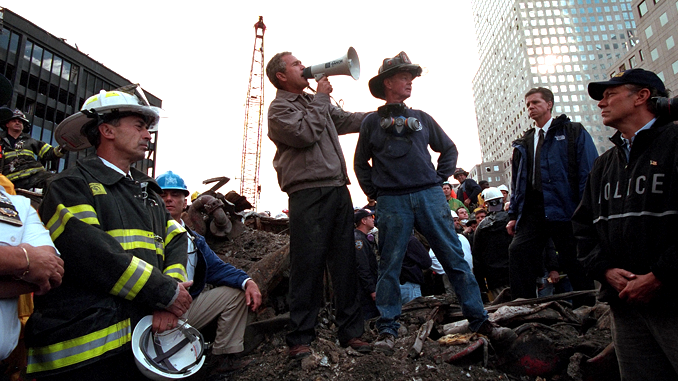
In the wake of the September 11th, 2001 attacks, Americans were bombarded with assurances we would never forget what had happened.
There were images from that day which have become iconic. President Bush being informed of the airplane strike, and completing the story he was reading to the children rather than panicking them. People holding hands and stepping out of windows rather than burn to death. The strike against the Pentagon. “Let’s roll.” Traumatized passengers from grounded planes being greeted and comforted by Canadians. Firefighters and police trying to get people to safety amidst clouds of ash. The 8:30 PM address to the nation. And, of course, the falling towers.
More moments followed. The President standing with recovery workers with his bullhorn, comforting and encouraging them while putting the terrorists on notice. Congress standing together for at least a little while to face our enemies. Grieving and stunned family members gathering and sharing photos, trying to determine if their loved ones were among the injured or the dead. The identification of Osama Bin Laden. Rallies against terrorism. President Bush, against the recommendations of security, throwing out the first pitch.
I admit, I don’t remember it like it was yesterday. Instead I remember moments from the day and subsequent days, but those moments are still fresh in my mind.
I heard about the plane collision on the radio while driving into work in the morning. Lacking any visual reference, I was under the impression that it was a small plane, and that it would be a momentary trivia item. Only as I got into work and heard the reactions of people did I realize that it was a passenger jet.
Someone wheeled in a television, and we watched as the tower burned. A discussion started about whether it could fall, and the consensus was that it couldn’t happen. As we watched, the second plane struck. We were still watching as first the one, then the other tower collapsed.
We were all stunned, and even though in retrospect it was obviously a militaristic strike, some of my co-workers seemed determined to think of an alternative explanation. We watched until it became too painful, then went back to our desks and tried to work while listening to radio updates, then went back to the television. That was how the day passed.
I’m asking now for your memories. Memories of events and images that were broadcast for the world to see, that others can be reminded of them; and memories of what was happening to you on that day, so we can all retain those connections to that terrible day when we realized war had been declared upon us.
